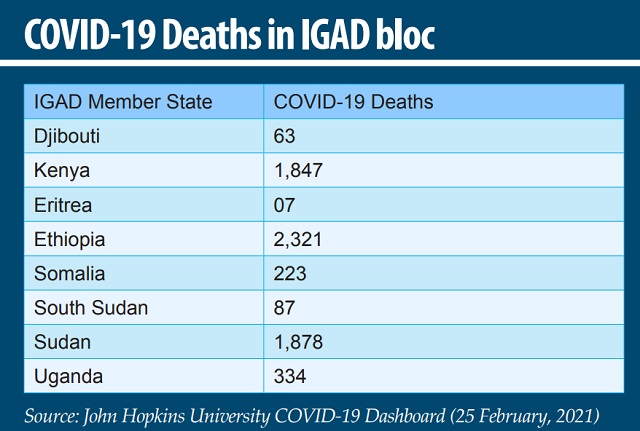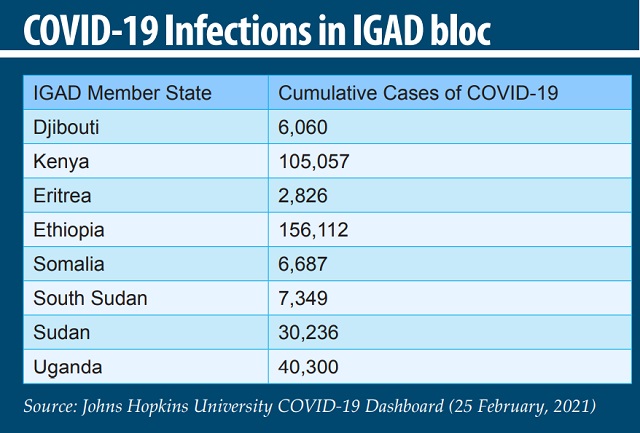
Gebeyehu sought to draw parallels between the interventions IGAD often employs in one of the most conflict-prone sub-regions on the continent and what he called the most devastating pandemic in 100 years.
“The Coronavirus is unlike any other adversary we have faced in the IGAD region. We cannot conduct diplomatic negotiations with it, we cannot enter a ceasefire agreement with it, we cannot initiate a mediation process with it and we cannot deploy peacekeepers against it.”
“The virus leaves us with only one choice, to defeat it through prevention and containment. We must continue arming ourselves with the knowledge, the practices, and equipment that we need to overcome this pandemic.”
“Our position at IGAD is that access to the Coronavirus vaccine should not be dependent on the economic capacity of a country. I call upon you here and all partners in the international community to come together and join hands against ‘vaccine nationalism’ in all its forms.”
“COVAX should be humanized and not monetized. As history taught us with the last major pandemic of HIV/AIDS that affected our continent; humanity comes first,” Gebeyehu said.
Attilio Pacifici, the head of the EU Delegation in Uganda noted that ever since the outbreak of the Coronavirus on the continent, the EU and its member states, had supported Africa in responding to the COVID-19 pandemic.
“Today’s event is another manifestation of the EU’s solidarity to its partner countries in Africa, including Uganda. It is also a demonstration of the EU’s continued commitment to not leave anybody behind when it comes to addressing global challenges,” Pacifici said.
He said the EU’s support through IGAD confirms Europe’s commitment to support Uganda during such a long and unprecedented crisis adding up to €14 million (Shs 62bn) already provided for emergency support at the beginning of the pandemic last year.
“Absolutely crucial is to recall that at the global level, the EU is also supporting the rollout of the vaccination campaigns,” he said.
Pacifici said the inevitably necessary lockdowns and restrictions on movements have had a significant impact on supply chains, trade and livelihoods and created logistical challenges. He noted that the EU has responded with a regional EU grant of €60 million (Shs 267 billion) to help the countries to address the multiple challenges.
The EU-IGAD COVID-19 emergency response project focuses on vulnerable groups, including migrants, refugees, internally displaced persons (IDPs) and cross-border communities/cross-border mobile populations and their host communities.
The project focuses on the provision of health care services, wash services, supporting quarantine and isolation centres, prevention of gender based violence and risk communication as well as helping to ensure borders and critical supply chains are safe for trade.
It will also increase access to health and to critical medical equipment and will provide socio-economic support for vulnerable groups, specifically in cross-border areas. In addition, this action will support the development of digital solutions for the COVID-19 response, such as a regional surveillance and monitoring system.
Rosa Malango, the UN resident coordinator in Uganda welcomed the inclusion of refugee hosting communities in this donation which is in line with collective efforts to make sure that no one is left behind during these unprecedented times.
Dr. Jane Ruth Aceng, the Minister of Health welcomed the continued support from the government’s development partners. She said, thanks to the support, Uganda has proactively responded to the COVID-19 pandemic.
This, she said, has resulted into successful suppression and importation of the virus and delayed the entrenchment of community spread and Uganda has managed to contain the widespread transmission of COVID-19 among the communities.
“I would like to appreciate the EU and IGAD for this timely donation of PPEs and ambulances to enhance the preparedness and response to COVID-19 pandemic in Uganda going forward.”
Aceng referred to the latest donation to the government as a “timely” one as it will cater for enormous needs of frontline health workers, as well as ease mobility of the responders and referred clients in the districts, the cross-border areas and points of entries.
She said Uganda is still in a critical stage of the COVID-19 response. Aceng said she is still worried about majority of Ugandans not following the SOPs instituted about a year ago to control the pandemic.
“The fight against COVID-19 requires a concerted effort of all actors and an effective partnership such as one we are witnessing today with the EU and IGAD,” she said.
“By ensuring we have sufficient stocks of protective equipment and Infection Prevention and Control supplies, we shall protect our citizens, curtail transmission of the pandemic and sustain continuity of essential healthcare services.”

****
 The Independent Uganda: You get the Truth we Pay the Price
The Independent Uganda: You get the Truth we Pay the Price


